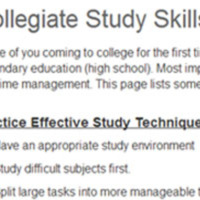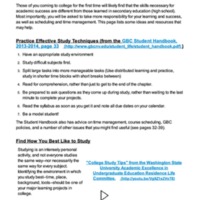Collegiate Study Skills - WebCampus Page
Dublin Core
Title
Collegiate Study Skills - WebCampus Page
Subject
WebCampus Page with html code for links to study skills and student resources.
Description
A complete WebCampus page in HTML coding with links to various collegiate study skill guides and student resources at GBC.
Creator
Scott A. Gavorsky
Date
2013-2014
Contributor
Scott A. Gavorsky
Rights
Creative Commons
Language
English / HTML code
Text Item Type Metadata
Text
<h3 style="text-align: left;"><span style="font-size: medium;">Those of you coming to college for the first time will likely find that the skills necessary for academic success are different from those learned in secondary education (high school). Most importantly, you will be asked to take more responsibility for your learning and success, as well as scheduling and time management. </span><span style="font-size: medium;">This page lists some ideas and resources that may help.</span></h3>
<h4><span style="text-decoration: underline;"><strong>Practice Effective Study Techniques (from the <a href="http://www.gbcnv.edu/student_life/student_handbook.pdf">GBC Student Handbook, 2013-2014, page 33</a>)</strong></span></h4>
<ol>
<li>
<p><span style="font-size: medium;">Have an appropriate study environment</span></p>
</li>
<li>
<p><span style="font-size: medium;">Study difficult subjects first.</span></p>
</li>
<li>
<p><span style="font-size: medium;">Split large tasks into more manageable tasks (Use distributed learning and practice, study in shorter time blocks with short breaks between)</span></p>
</li>
<li>
<p><span style="font-size: medium;">Read for comprehension, rather than just to get to the end of the chapter.</span></p>
</li>
<li>
<p><span style="font-size: medium;">Be prepared to ask questions as they come up during study, rather than waiting to the last minute to complete your projects.</span></p>
</li>
<li>
<p><span style="font-size: medium;">Read the syllabus as soon as you get it and note all due dates on your calendar.</span></p>
</li>
<li>
<p><span style="font-size: medium;">Be a model student!</span></p>
</li>
</ol>
<p><span style="font-size: medium;">The Student Handbook also has advise on time management, course scheduling, GBC policies, and a number of other issues that you might find useful (see pages 32-39). </span></p>
<p><span style="font-size: medium;">Below are a series of short videos looking at various key collegiate study skills.<br /><br /></span></p>
<h4><span style="text-decoration: underline;"><strong>Find How You Best Like to Study</strong></span></h4>
<table border="0" cellpadding="25">
<tbody>
<tr>
<td width="40%">
<p style="vertical-align: top;"><span style="font-size: medium;">Studying is an intensely personal activity, and not everyone studies the same way--nor necessarily the same way for every subject. Identifying the environment in which you study best--time, place, background, tools--should be one of your major learning projects in college.</span><br /><br /></p>
<p><span style="font-size: medium;">There are, however, some commonalities in <em><strong>bad</strong></em> study techniques. Students at Washington State University put together this video discussing some of the issues involved in studying at the collegiate level.</span></p>
</td>
<td style="text-align: center; background-color: #eeeeee;"><span style="font-size: medium;"><a id="" href="http://youtu.be/Vg9Z1s2VoT8">"College Study Tips" from the Washington State University Academic Excellence in Undergraduate Education Residence Life Committee.</a></span></td>
</tr>
</tbody>
</table>
<p> </p>
<h4><span style="text-decoration: underline;"><strong>Reading Strategies: SQ3R<br /></strong></span></h4>
<table border="0" cellpadding="25">
<tbody>
<tr>
<td width="40%">
<p><span style="font-size: medium;">Reading is not a simple skill. Information does not just pass from the page into the student. It requires the effort to place the information into a larger context, which means the reader must actively engage with the material being read.</span><br /><br /></p>
<p><span style="font-size: medium;">SQ3R stands for "Survey, Question, Read, Recite, and Review." This is one approach to active reading that is quite popular for college students who are confronting complex texts for the first time.</span></p>
</td>
<td style="text-align: center; background-color: #eeeeee;"><span style="font-size: medium;"><a id="" href="http://youtu.be/8Ui2mpPDP7E">Dr. John Body of the Office of Learning Strategies at Mount Holyoke College explains the SQ3R Method.</a></span>
<p><span style="font-size: medium;"> </span></p>
</td>
</tr>
</tbody>
</table>
<p> </p>
<h4><span style="text-decoration: underline;"><strong>Cornell Note-Taking System</strong></span></h4>
<table border="0" cellpadding="10">
<tbody>
<tr>
<td width="40%">
<p><span style="font-size: medium;">Many students arrive in college with poor note-taking skills. While digital technology provides an easy means of looking up and verifying factual information, note-taking is still a valuable skill in dynamic environments where relationships between facts must be captured--such as in a classroom discussion or business meeting.<br /><br /></span></p>
<p><span style="font-size: medium; line-height: 20px;">The </span><strong style="font-size: medium; line-height: 20px;">Cornell Note-Taking System</strong><span style="font-size: medium; line-height: 20px;"> was developed by Dr. Walter Pauk, director of Cornell University's Reading and Study Center and author of </span><em style="font-size: medium; line-height: 20px;">How to Study in College</em><span style="font-size: medium; line-height: 20px;">. Pauk's system has been widely used in colleges since the 1960s because it provides an emphasis on synthesis, analysis, and application over simple recall of information (see Keil Jacobs, "</span><a style="font-size: medium; line-height: 20px;" href="http://soar.wichita.edu/dspace/bitstream/handle/10057/1388/grasp-2008-56.pdf?sequence=1">A Comparison of Two Note Taking Methods in a Secondary English Classroom</a><span style="font-size: medium; line-height: 20px;">" in </span><em style="font-size: medium; line-height: 20px;">Proceedings: 4th Annual Symposium: Graduate Research and Scholarly Projects</em><span style="font-size: medium; line-height: 20px;"> [79], Wichita State University, April 25, 2008).</span></p>
</td>
<td style="text-align: center; background-color: #eeeeee;"><span style="font-size: medium;"><a id="" href="http://youtu.be/JPSmXRIlyS8">S. Clowes demonstrates the Cornell Note Taking System</a></span></td>
</tr>
</tbody>
</table>
<p> </p>
<h4><span style="text-decoration: underline;"><strong>Campus Resources</strong></span></h4>
<p><span style="font-size: medium;">Even though the ultimate responsibility for learning is yours, GBC offers a number of resources to help you complete your studies here. If you are feeling lost or overwhelmed, but all means consult one of these resources. Among the most commonly used are:</span></p>
<p><span style="font-size: medium;"><a href="http://www.gbcnv.edu/asc/">Academic Success Center:</a> Tutoring is available for a wide range of subjects as well as general skills such as writing and research.</span></p>
<p><span style="font-size: medium;"><a href="http://www.gbcnv.edu/retention/">Student Support Services:</a> Support for balancing college with everyday life, and Peer Mentoring is available.</span></p>
<p><span style="font-size: medium;"><a href="http://www.gbcnv.edu/computing/helpdesk.html">GBC Computer Help Desk:</a> Problems with WebCampus or other software? This should be your first stop for support.</span></p>
<p><span style="font-size: medium;"><a href="http://www.gbcnv.edu/disabilities/">Services for Students with Disabilities:</a> They can assist in making any necessary arrangements required by documented disabilities.</span></p>
<p>Instructor: If you are unsure about items for this course, or any other issue, feel free to contact your instructor. </span></p>
<p> </p>
<h4><span style="text-decoration: underline;"><strong>Practice Effective Study Techniques (from the <a href="http://www.gbcnv.edu/student_life/student_handbook.pdf">GBC Student Handbook, 2013-2014, page 33</a>)</strong></span></h4>
<ol>
<li>
<p><span style="font-size: medium;">Have an appropriate study environment</span></p>
</li>
<li>
<p><span style="font-size: medium;">Study difficult subjects first.</span></p>
</li>
<li>
<p><span style="font-size: medium;">Split large tasks into more manageable tasks (Use distributed learning and practice, study in shorter time blocks with short breaks between)</span></p>
</li>
<li>
<p><span style="font-size: medium;">Read for comprehension, rather than just to get to the end of the chapter.</span></p>
</li>
<li>
<p><span style="font-size: medium;">Be prepared to ask questions as they come up during study, rather than waiting to the last minute to complete your projects.</span></p>
</li>
<li>
<p><span style="font-size: medium;">Read the syllabus as soon as you get it and note all due dates on your calendar.</span></p>
</li>
<li>
<p><span style="font-size: medium;">Be a model student!</span></p>
</li>
</ol>
<p><span style="font-size: medium;">The Student Handbook also has advise on time management, course scheduling, GBC policies, and a number of other issues that you might find useful (see pages 32-39). </span></p>
<p><span style="font-size: medium;">Below are a series of short videos looking at various key collegiate study skills.<br /><br /></span></p>
<h4><span style="text-decoration: underline;"><strong>Find How You Best Like to Study</strong></span></h4>
<table border="0" cellpadding="25">
<tbody>
<tr>
<td width="40%">
<p style="vertical-align: top;"><span style="font-size: medium;">Studying is an intensely personal activity, and not everyone studies the same way--nor necessarily the same way for every subject. Identifying the environment in which you study best--time, place, background, tools--should be one of your major learning projects in college.</span><br /><br /></p>
<p><span style="font-size: medium;">There are, however, some commonalities in <em><strong>bad</strong></em> study techniques. Students at Washington State University put together this video discussing some of the issues involved in studying at the collegiate level.</span></p>
</td>
<td style="text-align: center; background-color: #eeeeee;"><span style="font-size: medium;"><a id="" href="http://youtu.be/Vg9Z1s2VoT8">"College Study Tips" from the Washington State University Academic Excellence in Undergraduate Education Residence Life Committee.</a></span></td>
</tr>
</tbody>
</table>
<p> </p>
<h4><span style="text-decoration: underline;"><strong>Reading Strategies: SQ3R<br /></strong></span></h4>
<table border="0" cellpadding="25">
<tbody>
<tr>
<td width="40%">
<p><span style="font-size: medium;">Reading is not a simple skill. Information does not just pass from the page into the student. It requires the effort to place the information into a larger context, which means the reader must actively engage with the material being read.</span><br /><br /></p>
<p><span style="font-size: medium;">SQ3R stands for "Survey, Question, Read, Recite, and Review." This is one approach to active reading that is quite popular for college students who are confronting complex texts for the first time.</span></p>
</td>
<td style="text-align: center; background-color: #eeeeee;"><span style="font-size: medium;"><a id="" href="http://youtu.be/8Ui2mpPDP7E">Dr. John Body of the Office of Learning Strategies at Mount Holyoke College explains the SQ3R Method.</a></span>
<p><span style="font-size: medium;"> </span></p>
</td>
</tr>
</tbody>
</table>
<p> </p>
<h4><span style="text-decoration: underline;"><strong>Cornell Note-Taking System</strong></span></h4>
<table border="0" cellpadding="10">
<tbody>
<tr>
<td width="40%">
<p><span style="font-size: medium;">Many students arrive in college with poor note-taking skills. While digital technology provides an easy means of looking up and verifying factual information, note-taking is still a valuable skill in dynamic environments where relationships between facts must be captured--such as in a classroom discussion or business meeting.<br /><br /></span></p>
<p><span style="font-size: medium; line-height: 20px;">The </span><strong style="font-size: medium; line-height: 20px;">Cornell Note-Taking System</strong><span style="font-size: medium; line-height: 20px;"> was developed by Dr. Walter Pauk, director of Cornell University's Reading and Study Center and author of </span><em style="font-size: medium; line-height: 20px;">How to Study in College</em><span style="font-size: medium; line-height: 20px;">. Pauk's system has been widely used in colleges since the 1960s because it provides an emphasis on synthesis, analysis, and application over simple recall of information (see Keil Jacobs, "</span><a style="font-size: medium; line-height: 20px;" href="http://soar.wichita.edu/dspace/bitstream/handle/10057/1388/grasp-2008-56.pdf?sequence=1">A Comparison of Two Note Taking Methods in a Secondary English Classroom</a><span style="font-size: medium; line-height: 20px;">" in </span><em style="font-size: medium; line-height: 20px;">Proceedings: 4th Annual Symposium: Graduate Research and Scholarly Projects</em><span style="font-size: medium; line-height: 20px;"> [79], Wichita State University, April 25, 2008).</span></p>
</td>
<td style="text-align: center; background-color: #eeeeee;"><span style="font-size: medium;"><a id="" href="http://youtu.be/JPSmXRIlyS8">S. Clowes demonstrates the Cornell Note Taking System</a></span></td>
</tr>
</tbody>
</table>
<p> </p>
<h4><span style="text-decoration: underline;"><strong>Campus Resources</strong></span></h4>
<p><span style="font-size: medium;">Even though the ultimate responsibility for learning is yours, GBC offers a number of resources to help you complete your studies here. If you are feeling lost or overwhelmed, but all means consult one of these resources. Among the most commonly used are:</span></p>
<p><span style="font-size: medium;"><a href="http://www.gbcnv.edu/asc/">Academic Success Center:</a> Tutoring is available for a wide range of subjects as well as general skills such as writing and research.</span></p>
<p><span style="font-size: medium;"><a href="http://www.gbcnv.edu/retention/">Student Support Services:</a> Support for balancing college with everyday life, and Peer Mentoring is available.</span></p>
<p><span style="font-size: medium;"><a href="http://www.gbcnv.edu/computing/helpdesk.html">GBC Computer Help Desk:</a> Problems with WebCampus or other software? This should be your first stop for support.</span></p>
<p><span style="font-size: medium;"><a href="http://www.gbcnv.edu/disabilities/">Services for Students with Disabilities:</a> They can assist in making any necessary arrangements required by documented disabilities.</span></p>
<p>Instructor: If you are unsure about items for this course, or any other issue, feel free to contact your instructor. </span></p>
<p> </p>
Original Format
INSTRUCTIONS:
1) Copy the text above.
2) In WebCampus course shell, click Add New Page.
3) In page editor, click on "HTML Editor"
4) Paste the text into the HTML Editor.
5) Save and test links.
1) Copy the text above.
2) In WebCampus course shell, click Add New Page.
3) In page editor, click on "HTML Editor"
4) Paste the text into the HTML Editor.
5) Save and test links.
Collection
Citation
Scott A. Gavorsky, “Collegiate Study Skills - WebCampus Page,” Humanities Center at Great Basin College, accessed April 25, 2024, https://humanities.gbcnv.edu/omeka/items/show/23.

